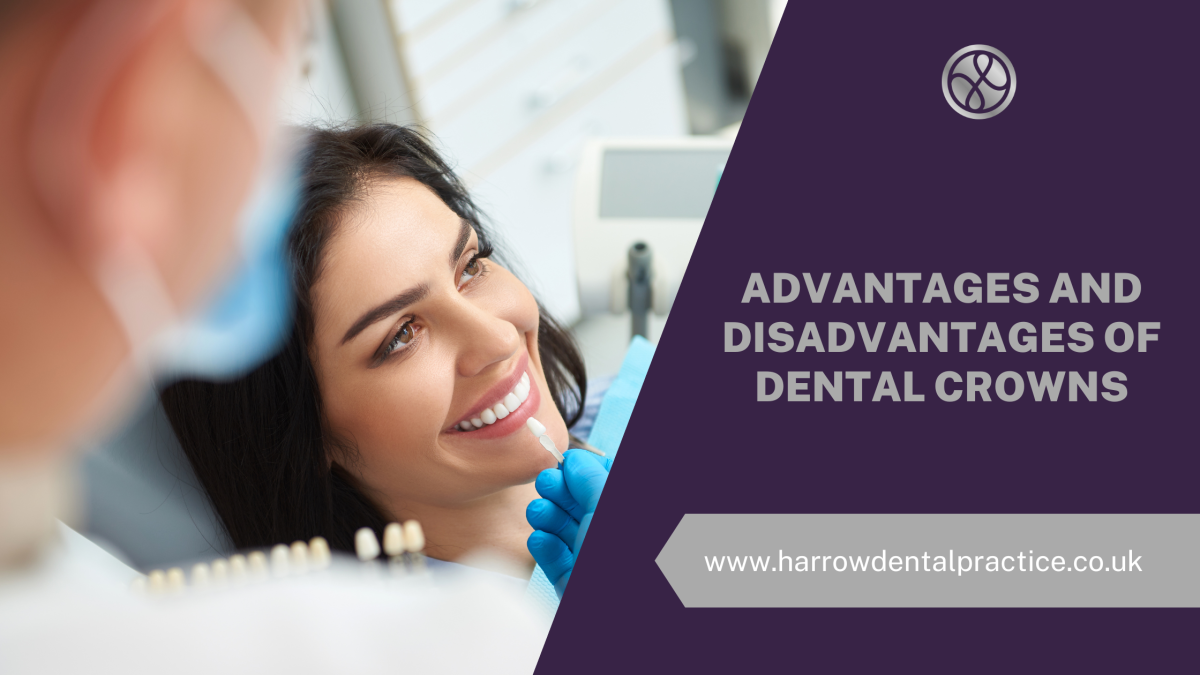Chipped, crooked or discoloured teeth can ruin one’s smile and make chewing and speech difficult. However, this does not mean that you have to live with these tooth defects. A beautiful smile is the key to appearing attractive and friendly. An American Academy of Cosmetic Dentistry survey showed that people who have beautiful smiles and perfect teeth are perceived as more friendly, intelligent, and approachable than those with flawed smiles.
So, what can cosmetic dentistry do about crooked and worn-out teeth? There are many options available, but dentists commonly use dental crowns for this purpose. So, what are dental crowns, and how do they help restore one’s smile and facial aesthetics? You will learn in this blog. So, continue reading to find everything you need to know about dental crowns.
What Are The Pros And Cons Of Dental Crowns?
If you are considering dental crowns, the first thing you will think about is their benefits and drawbacks. After all, you are investing in your facial aesthetics, so you need to be sure about what you’re getting into. Here are some pros and cons of dental crowns that will help you decide whether this treatment option is right for you.
Pros of Dental Crowns
- Lifelike aesthetics and ability to blend in perfectly with neighbouring teeth
- Can treat a variety of cosmetic and restorative tooth defects
- Reasonable durability if looked after properly
- Remain fixed to the teeth
- Restore one’s ability to eat and speak normally
Cons of Dental Crowns
- Require extensive tooth removal than bonded fillings
- Can get stained over time
- Can get detached if one bites on extremely hard or sticky foods
- More expensive than bonded restorations
What Is Better, A Metal Crown Cap or a Ceramic Cap?
According to the British Academy of Cosmetic Dentistry, a crown is a cap-shaped structure that rests on the exposed surface of damaged teeth and is used for restoring their aesthetics and structure.
Now that we know what a crown or cap is, the next question is whether a metal or ceramic crown would be suitable for you. The answer depends on your requirements. For example, if aesthetics and appearance are your foremost priority, you should consider a ceramic crown. Why? Because ceramic crowns are made of tooth-cloured ceramic, they blend in with your teeth and become virtually indistinguishable from the existing natural teeth. Although metal crowns are very strong and durable, many patients don’t like them due to their unaesthetic metallic appearance. Besides, these days ceramic-based crowns are made of highly durable materials. So, they can be easily used in replacement of metal crowns.
How Much Do Gold Crowns And Porcelain Crowns Cost?
A gold crown is made of gold alloys. Gold-based crowns were extensively used a few decades back. However, due to the rising cost of gold and their yellowish appearance, their use has declined. More importantly, aesthetically more pleasing ceramic-based crowns are now available and are preferred by patients. If you are considering gold crowns, they may cost around £600 – £1000 per tooth. On the other hand, if you want to get your teeth restored with porcelain crowns, they may cost around £600 – £1200. The cost of dental crowns and other cosmetic treatment options like bonding and veneers depends on various factors and also varies according to the dentist’s skill, qualifications, and location.
What Are The Benefits Of Getting Metal-Free Dental Crowns?
Metal-free crowns offer various benefits over metal-based ones:
- Metal crowns have a distinct metallic appearance which is not liked by many. On the other hand, metal-free crowns, such as those made of porcelain or composites, have a lifelike appearance
- Some patients are allergic to the metals in crowns made of metal alloys. For these patients, metal-free crowns are a better option.
What Type Of Dental Crown Do Most Dentists Like The Most?
A dentist will give you a prosthesis or restoration that best suits your dental needs and restores your facial aesthetics. Toot-coloured porcelain crowns are commonly used these days for restoring damaged teeth. These crowns are popular among dentists and patients due to their excellent aesthetics, safety, and reasonable durability. In some cases, dentists also consider metal-ceramic crowns when superior strength is needed, especially in the back teeth that receive very high biting forces.
Can A Porcelain Dental Crown Last A Lifetime?
Like all other dental restorations, dental crowns have a limited lifetime. For example, if you look after your porcelain crowns properly through optimal oral hygiene and diet management, you can expect them to last up to 10 years.
How Effective Are Dental Crowns?
Dental crowns are very effective in restoring aesthetic, restorative, and structural tooth defects. For example, if someone has chipped, stained, or crooked teeth, they can get a smile makeover with dental crowns. Besides, dental crowns also strengthen the teeth. Hence, they also restore one’s ability to chew and speak normally.
Should Old Dental Crowns Be Replaced?
If an old dental crown is not causing any issues or affecting your facial aesthetics, there is no need to replace it. However, if you have a worn-out dental crown affecting your smile, it should be replaced with a new one. Moreover, fractured or stained crowns or veneers should also be replaced as they cannot serve their aesthetic or restorative purpose.
If you are looking for the best cosmetic dentist in Hornchurch, your first choice should be Harrow Dental Practice, where all general and aesthetic dental procedures are offered in a comfortable and relaxing environment. So, request a consultation with us today and let us give you a healthy and lasting smile.

